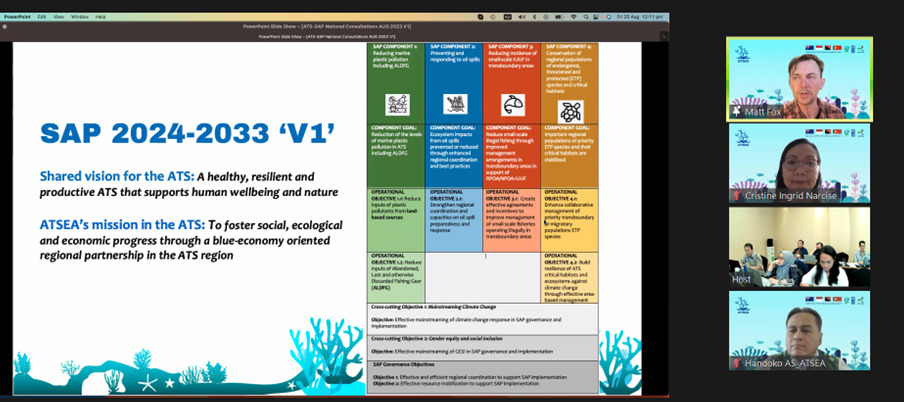In 2023, a series of workshops and consultations focused on refining the Strategic Action Programme (SAP) for the Arafura and Timor Seas (ATS) marine ecosystem. These collaborative efforts represent an integral component of the Arafura and Timor Seas Ecosystem Action Phase II (ATSEA-2) Project and its ongoing commitment to foster and facilitate cooperation between Australia, Indonesia, Papua New Guinea and Timor-Leste.
The ATS-SAP updating process is a continuous and collaborative endeavour, which aims to secure the protection and sustainable management of the ATS. Over two semesters in 2023, which were characterised by regional cooperation and the meticulous updating of the SAP framework, ATSEA-2 has been working to build a healthier marine environment in this vital region.
On 11 July 2023, a first draft of the updated SAP (‘Version 1’ or V1) was presented at the Intersessional Regional Steering Committee (RSC) Meeting. In the meeting, member states provided feedback and recommendations to the Regional Project Management Unit (RPMU), leading to the creation of a SAP ‘Version 2’ (V2) by the Transboundary Diagnostic Analysis (TDA)/SAP Specialist.
Then, in August 2023, national consultations provided a detailed review of the V2 draft, particularly the key targets for the SAP, and generated ‘project concepts’ to support SAP initiation and implementation in 2024. National consultation workshops involving multi-sectoral TDA-SAP National Working Groups (NWGs) and key stakeholders were held in Timor-Leste, Papua New Guinea and Indonesia on 18, 24 and 25 August 2023, respectively. Written feedback from key agencies in Australia were sent to the RPMU by the National Focal Point (NFP).
On 8 September 2023, the ATSEA-2 Project conducted a Regional SAP Review Workshop with the TDA-SAP Regional Working Group (RWG). The workshop provided updates to RWG members and National Project Directors (NPD)/NFP on inputs gathered during the August round of national consultations, and discussed potential refinements to the draft updated SAP. The discussions highlighted the importance of baseline information, along with a monitoring and evaluation framework, and an adaptive management approach in response to future changes and developments.

In addition, the workshop provided valuable recommendations on the SAP targets and draft ‘project concepts’, for consideration in developing the ‘Version 3’ draft updated SAP. The workshop also agreed on the process for finalising the draft SAP through another round of country reviews and a pre-RSC meeting to review V3 prior to submitting the final draft updated SAP for endorsement at the fifth RSC Meeting, to be held in November 2023.
The ATSEA-2 Project initiated this journey with a regional workshop back in February 2023. This gathering brought together experts from the four participating countries, ATS NPDs, NFP, NWGs and RWG members. Its objectives included the completion of an updated TDA and the launch of the SAP renewal process.
During this workshop, consensus was reached on four key issues for the updated SAP: marine plastic pollution, including abandoned, lost, or discarded fishing gear; oil spills; endangered species; and illegal, unreported and unregulated (IUU) fishing. The workshop culminated in the collaborative development of a proposed SAP framework for 2024-2033, which incorporated a revised vision, component goals and operational objectives for these key issues.
In April and May 2023, momentum generated by the Regional Workshop continued with National Strategic Thinking and Strategic Planning Workshops, held in Indonesia, Papua New Guinea and Timor-Leste. These sessions allowed each participating country to conduct detailed reviews and provide feedback on the draft SAP framework, component goals, operational objectives, priority actions and targets. The inputs gathered were consolidated and reviewed by the RPMU, resulting in a revised draft of the SAP framework.
In May 2023, the Regional SAP Strategic Planning Workshop was convened to further refine the SAP framework. This two-day workshop brought together NPDs from Indonesia, Papua New Guinea and Timor-Leste, along with the NFP for Australia, to address SAP cross-cutting issues such as climate change, gender equality and governance. Following the workshop, an SAP ‘Version 1’ document was shared with the RPMU and RWG for review.
Throughout 2023, the process of updating the SAP framework has helped to secure protection for the ATS region and improve the sustainable management of its natural resources. During this process, ATSEA-2 has facilitated important dialogues, fostered cooperation and reiterated the commitments of Australia, Indonesia, Papua New Guinea and Timor-Leste to safeguarding their shared natural heritage for generations to come.
By Stella Yovita Arya Puteri and Cristine Ingrid Narcise


